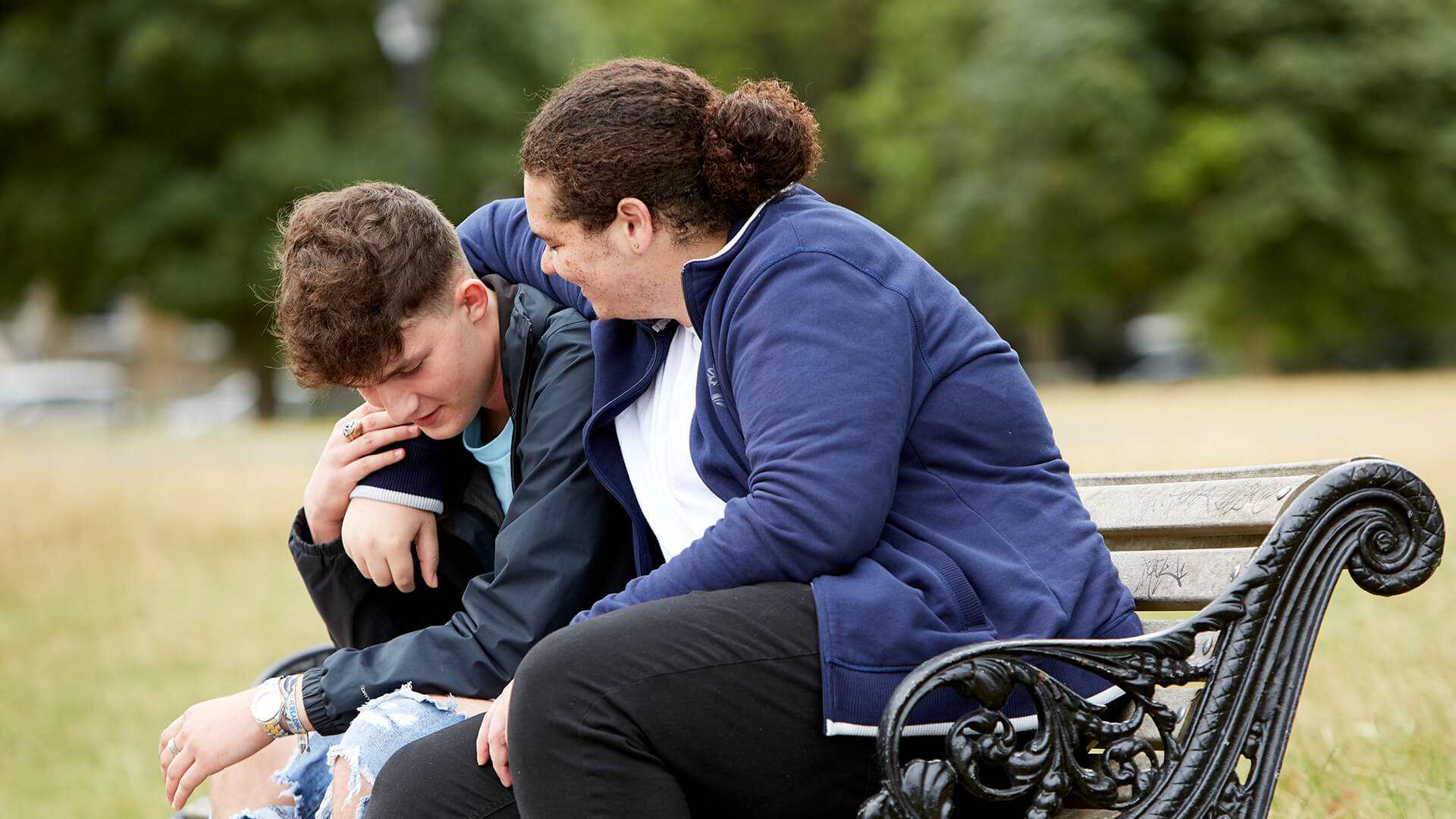What is self-harm?

Self-harm is when you hurt yourself on purpose to relieve feelings of distress. People sometimes self-harm when life feels hard to cope with.
If you self-harm, you might be dealing with lots of intense thoughts and feelings and hurting yourself feels like the only way to let those feelings out.Or you might feel numb and want to hurt yourself so that you can feel something.
Self-harm is a way to show the feelings you have inside on the outside. It might cause you to experience:
- pain or discomfort
- temporary physical marks
- scarring
- feelings of sickness or dizziness
- feelings of weakness, shame or disgust
- feeling scared, out of control or confused by why you are doing this
- feelings of isolation and loneliness
Self-harm is when you hurt yourself on purpose to relieve feelings of distress. People sometimes self-harm when life feels hard to cope with.
It is important to note that self-harm is not always obvious. You might find yourself doing things which are harmful, but not think of them as ‘self-harm’. This could include things like:
- using drugs or alcohol to cope with our problems
- not eating, over-eating, or forcing ourselves to throw up
- spending all our time on addictive behaviours like gaming, social media or gambling
- over-exercising and/or exercising when we are injured
- getting into fights
- getting into situations on purpose where we risk getting hurt, including
- risky sexual behaviour
Often self-harm only brings temporary relief. This means that later, when things start to build up again, we might feel like we have to harm again. It can be really hard to break out of this cycle. And it can be upsetting to think that this is our only way to cope. But there are things you can do to stop self-harming and get better.
People self-harm for many different reasons. Some people find it hard to explain why they do it, but often it’s a way for people to let out feelings that are hard to explain or control.
Why do I self-harm?
There are many reasons why you might self-harm. It is usually a symptom that something stressful or upsetting is going on in your life that is difficult to deal with. This could be something like:
- suffering abuse
- experiencing a traumatic incident
- family problems like a divorce
- bullying
- a sudden change in your life, like a death, divorce or moving school
- exam stress or extreme pressure or criticism from family, friends or teachers
- low self-esteem or issues with body image
- loneliness
- feelings of guilt, failure, or being unloved
Things can happen in life that can leave us feeling overwhelmed, angry and hurt. Instead of finding ways to express those feelings to the world, we start to take this pain and anger out on ourselves.
We might self-harm because we have learnt that in order to be accepted or loved we have to be ‘perfect’. When we don’t live up to this ‘perfect’ image we can feel like a ‘failure’. The constant guilt, or worry about disappointing people, can make us feel like we need to punish ourselves for not being ‘good enough’. With the right support, you can stop feeling this way, and learn to love yourself for who you are.
We might self-harm because we are angry and upset about being treated badly. If we are treated in a way that makes us feel invisible, unimportant or unloved, it can make us feel like there is something wrong with us. But the truth is, you matter. You are worthy of respect and love exactly the way you are, and you deserve help.
Overall, the most important thing which I hope everyone knows is you don't have to go through this alone.
How can I stop self-harming?

Talk to someone
Talking about how you’re feeling with someone you trust can feel like a relief. This person could be a friend, family member, teacher, school counsellor/nurse, or youth worker. Think about who you feel safe with and how you would feel most comfortable communicating, whether it’s face to face, over the phone, by text or email.
It’s understandable if you’re worried no one will understand you, or that people might judge you. But don’t worry, there are lots of trained people who do understand and really care. That’s because they speak to thousands of young people who are going through this too. Nothing you can say will shock them, and they are here to listen and support you. Please take a look at the list of organisations at the end of this page, and don’t struggle on your own.

Get professional support
Professional support can make a massive difference. It’s ok to ask for help when you need it. We all need help sometimes, it doesn’t make you weak - in fact reaching out takes bravery and strength.
Your GP can refer you to Child and Adolescent Mental Health Services (CAMHS) so you can have an assessment and get the treatment that is right for you. You might be offered counselling or talking therapy, where you can talk with trained mental health professionals about what you are feeling and ways you can cope.
For more tips and advice, visit our guide on how to speak to your GP about mental health.
Keep a journal
Take a few minutes every day to write down how you are feeling. This can be a helpful way to let out your emotions. It can also help you to recognise what is bothering you and any patterns in what triggers you or causes you to feel bad.
If you don’t like writing, try doodling or drawing. Remember this is just a way to express yourself, there’s no right or wrong way to do this.
If you want to, you could show your journal to any mental health professionals who are supporting you to help them understand what you are going through.
Small changes that can boost your mood
- Consider how your use of social media is affecting your mood. Only follow accounts that make you feel positive and safe.
- Make sure you get enough sleep and stay hydrated – this can reduce your stress levels.
- Take time out when you need to.
- Think of three things you are grateful for each day.
- Be as kind to yourself as you would be to your best friend – think about the advice and support you would give someone else if you heard they were struggling.
Find ways to keep yourself safe

It’s really important to keep yourself as safe as possible and reduce your risk of serious self-injury. Even though you want to stop self-harming, you might not feel able to stop straight away. Sometimes it can take time to find new ways to cope, and that’s normal. In the meantime, think about other things you can do in the moment when you feel the urge to self-harm building. You could try to:
- go for a walk or do some gentle exercise
- focus on your breathing
- text a friend and let them know you need them to help you take your mind off things
- play music and sing or dance along
- hold an ice cube
- write down your thoughts
- hit a cushion or pillow
- tear up a magazine or newspaper
- make a self-soothe box
It is helpful if you tell your GP?

It is helpful if you tell your GP exactly what you are doing and what your worries are. This might feel daunting, but if you are honest with your doctor they can help you reduce some of the risks involved with your behaviour, as well as helping you get the support you need.
If you need medical treatment for your injuries, do make sure you get it. Don’t be afraid or embarrassed to go to your GP or hospital. They are there to help you get better and it is not their job to judge you.
You can also go to your local hospital A&E or medical centre if you are worried about what you might do to yourself and let them know your concern.
If you are in an emergency or worried for your life call 999.
Where to get help
Remember, you are not alone and here are some services who can help and support you and without judging you.
-
Calm Harm
A free app providing support and strategies to help you resist or manage the urge to self-harm.
Can be downloaded from Google Play or App Store.
-
MeeToo
A free app for teenagers (11+) providing resources and a fully-moderated community where you can share your problems, get support and help other people too.
Can be downloaded from Google Play or App Store.
-
Samaritans
Whatever you're going through, you can contact the Samaritans for support.
- Opening times:
- 24/7
-
Childline
If you’re under 19 you can confidentially call, chat online or email about any problem big or small.
Sign up for a free Childline locker (real name or email address not needed) to use their free 1-2-1 counsellor chat and email support service.
Can provide a BSL interpreter if you are deaf or hearing-impaired.
Hosts online message boards where you can share your experiences, have fun and get support from other young people in similar situations.
- Opening times:
- 24/7
-
The Mix
Offers support to anyone under 25 about anything that’s troubling them.
Email support available via their online contact form.
Free 1-2-1 webchat service available.
Free short-term counselling service available.
- Opening times:
- 3pm - 12am, seven days a week



